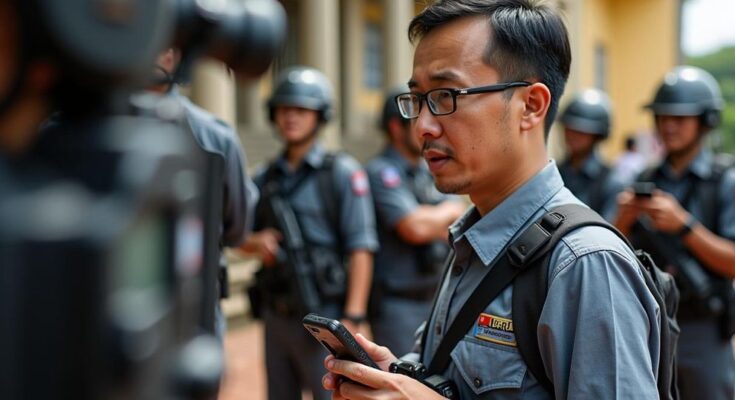Journalist Mech Dara has been arrested and charged with incitement, reflecting the Cambodian government’s crackdown on press freedom. Amnesty International condemns the charges, asserting that they are a tactic to silence dissenters and intimidate journalists. Dara’s investigative work exposed corruption and human trafficking in Cambodia, and now, advocates are calling for his immediate release in light of the unjust circumstances surrounding his detention.
In the heart of Cambodia, where the whispers of dissent grow fainter under the heavy hand of authority, journalist Mech Dara finds himself ensnared in a web of precarious accusations. The military police, like shadowy sentinels of repression, seized him from a car on the late afternoon of September 30. Just a day later, he stood before the court, shackled by the ominous charge of incitement, a label that has become the government’s favored tool to silence voices that dare to challenge the status quo. Kate Schuetze, Amnesty International’s Acting Deputy Regional Director for Research, articulated a chilling truth about this stark turn of events: the Cambodian government’s relentless pursuit to stifle press freedom is all but transparent. In her words, “The charges against Mech Dara show yet again that the Cambodian government will not hesitate to repress journalists.” Dara’s supposed crime? Simply exercising his fundamental right to free expression through his social media posts concerning pressing societal issues. Yet, instead of finding refuge in the sanctuary of journalism, he faces the grim specter of lengthy pre-trial detention, a mechanism often wielded to break spirits rather than uphold justice. Schuetze emphasizes the unduly harsh reality that “pre-trial detention is only permitted in exceptional circumstances and must not be used as a punishment.” Dara is not a mere name; he is a beacon of truth who has illuminated dark corners of corruption through his reporting with Cambodia Daily, Phnom Penh Post, and Voice of Democracy. His acclaimed work on the nefarious activities within Cambodia’s scam compounds opened eyes to the harrowing realities of human trafficking and torture that plague the nation. Now, as he languishes in detention, the call grows louder for the Cambodian authorities to relinquish their oppressive grip, with demands for his immediate and unconditional release echoing from human rights advocates. Dara’s arrest lays bare the broader climate of fear that shrouds Cambodian society, where incitement laws are wielded like swords against those who dare to question the authority of the state or expose its wrongdoings.
The case of journalist Mech Dara is emblematic of a disturbing trend in Cambodia, where the government increasingly resorts to oppressive measures against journalists and activists. Since taking office, the current regime has implemented a campaign to suppress press freedom through the misuse of legal statutes, particularly incitement laws. These laws have emerged as the go-to mechanism for targeting dissenters, often resulting in harsh sentences and preemptive detentions. Dara’s case has amplified concerns about the safety and rights of journalists in Cambodia, highlighting a grave atmosphere of fear and repression where critical voices struggle to survive. His investigative reporting, especially on sensitive topics like corruption, has not only earned him accolades but also made him a target for the authorities looking to maintain control over the narrative in the country.
The charges levied against Mech Dara are not merely a personal affront but a striking example of the Cambodian government’s ongoing assault on press freedom. As his story unfolds, it serves as a stark reminder of the precarious state of human rights in the nation, and the urgent need for solidarity in advocating for a just and liberated society where the truth can flourish unhindered. The fervent calls for Dara’s release resonate not only as a plea for his freedom but as a rallying cry for the many voices silenced by authoritarianism. In the shadows, the hope remains that the light of journalism can pierce through the darkness, reclaiming a space for truth and accountability in Cambodia.
Original Source: www.amnesty.org



